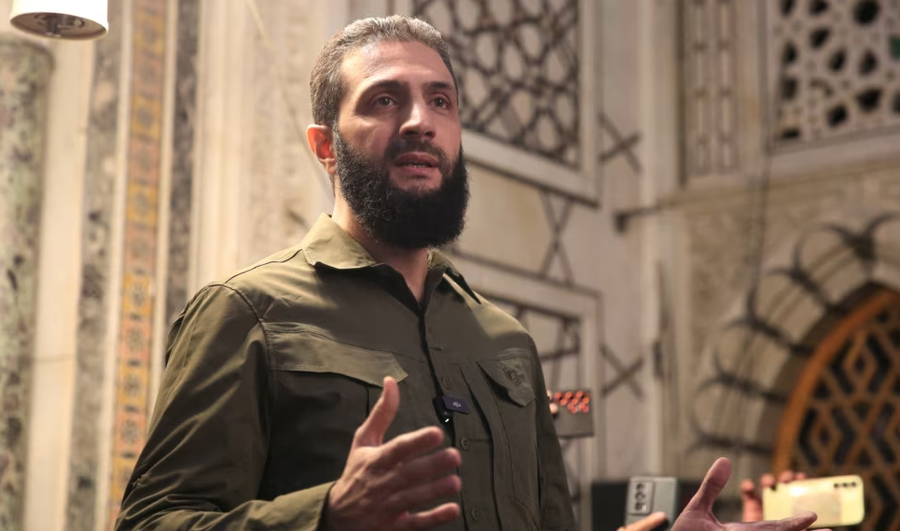
While the international community is setting conditions for the new power in Syria, the main rebel group is pursuing a cooperative approach, similar to that of the Taliban in Afghanistan, in trying to secure international recognition, analysts say. Ahmed al-Sharaa, also known as Abu Mohammed al-Golani, the leader of the Hayat Tahrir al-Sham or HTS group, met with the UN special envoy for Syria on Sunday and stressed the need for a " rapid and effective cooperation" for the reconstruction of the Syrian economy and the preservation of its territorial integrity.
In an interview with the newspaper from London, "The Times", al-Jolani said that the Syrian territory will not be used against any neighboring country, including Israel. Asfandyar Mir, an international affairs expert at the Washington-based American Institute of Peace, told VOA that HTS sent "a cooperative message," similar to what the Taliban offered after taking power in 2021, by "positioning itself in regional politics in a way that would not provoke the countries of the region and the global powers".
After taking power in August 2021, the Taliban sought to assure neighboring countries and regional powers that the group would not allow anyone to use Afghanistan for operations against any other country.
But the UN said in July that while the Taliban claim there are no foreign terrorist groups in Afghanistan, its member states reported that dozens of terrorist groups were operating inside the country. He added that "HTS" learned from the experience of the Taliban in avoiding hostilities abroad "trying to assure them that we have no conflict with you", says expert Mir.
He stressed that global and regional powers have relatively moderate intentions regarding the rebels in Syria, "but they will observe for a certain time the actions of the HTS group."
The Syrian rebels, led by the "HTS" group, launched an offensive against the forces of former President Bashar al-Assad on November 27 in the northern province of Idlib, and after capturing several strategic cities, they also took control of the country's capital, Damascus. 11 days later.
The United States welcomed the rebels' "encouraging" statements but said "we will judge them based on their actions".
"Decisions on our positions on sanctions, recognition and other issues will be based on the actions of the HTS group and other actors on the ground," State Department spokesman Mathew Miller said Monday in response to a question from VOA. .
A top EU diplomat said on Sunday that the European Union will not lift sanctions on Syria before the country's new leaders give guarantees on protecting minorities, women's rights and fighting terrorism.
The international community demanded similar guarantees from the Taliban after the group took power in Afghanistan in August 2021.
The international community demanded that the Taliban honor commitments to fight terrorism, form an inclusive government and respect human rights, especially women's rights, before being recognized as the legitimate government of Afghanistan.
No country has yet officially recognized the Taliban, although many countries have established diplomatic relations with the Taliban government.
Colin Clarke, from the organization 'The Soufan', told VOA that the United States' policy towards Syria is influenced by its experience in Afghanistan. "I think it helps a lot with what they do in terms of foreign policy," says Mr Clarke.
He said there are "a lot of similarities" between the way the Taliban and the rebel group Hayat Tahrir al-Sham (HTS) present themselves. "The effort is to appear more pragmatic, more moderate, distancing themselves from the more jihadist ideology," he added.
Mr Clarke said the question was whether HTS would remain moderate, however.
He said there are concerns about foreign militants, particularly those from Central Asia, within rebel groups.
"They may deviate or break away from the groups, or they may join other groups like the Islamic State, because they may see this whole governance project as a hopeless move," he added.
The UN, the United States, Turkey and many other countries have designated HTS as a terrorist organization.
HTS is "a coalition of Sunni Islamist insurgent groups based in northern Syria that split from Jabhat al-Nusrah, or 'Nusrah Front,' al-Qaeda's former branch in Syria," according to the Center's website. National Counter-Terrorism, the US agency whose main responsibility is the analysis of information on international terrorism.
In 2013, the US State Department added al-Sharaan to the list of global terrorists. The United States offered a reward of up to $10 million for information leading to his arrest.
Although the Taliban is not designated as a terrorist group by the State Department, the Haqqani, now part of the Taliban government, is among the groups that the United States has designated as terrorists.
Analyst Clarke said he thinks the Syrian rebels will be recognized more quickly than the Taliban because they represent "a newer phenomenon and don't have as long an aggravating past."
Merissa Khurma, director of the Middle East Program at the Washington-based Wilson Center, said it is "very difficult" to compare Syrian rebels with the Taliban.
"The rebels in Syria liberated the people from a brutal regime. A brutal regime came back to power in Afghanistan," said Mrs. Khurma.
But she said, in both cases, the governments against which these groups fought suffered from the great resentment that the country's inhabitants had towards them.
"It was clear that both governments were collapsing," she said./ VOA (A2 Televizion)











